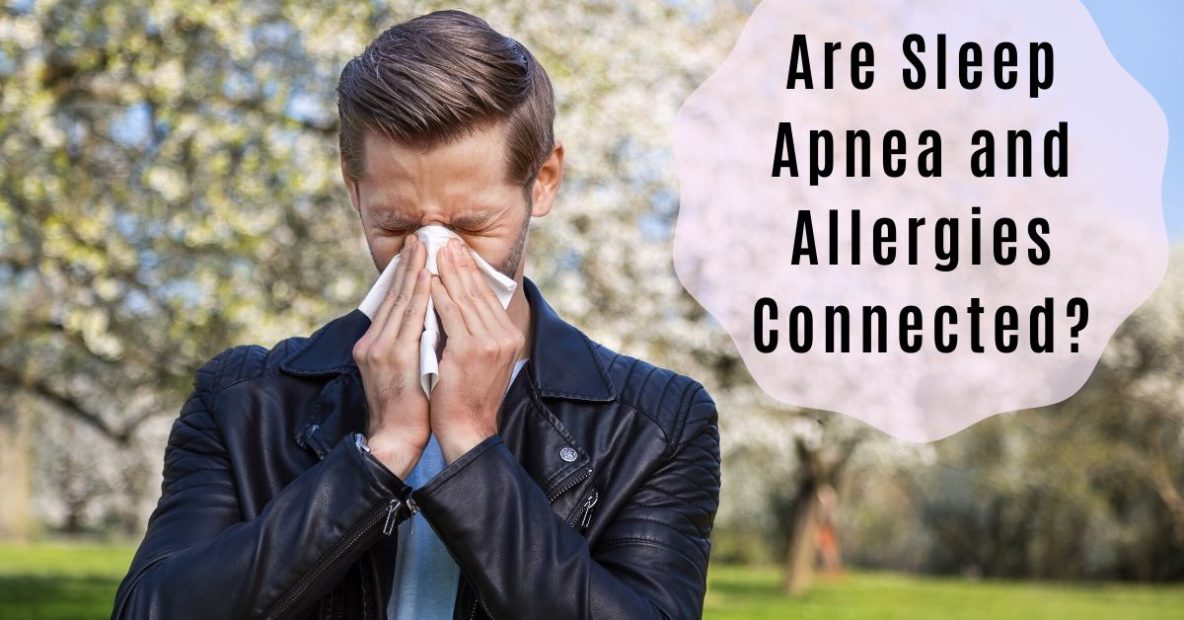Are Sleep Apnea and Allergies Connected?

- A Promising Paradigm Shift: New Research Challenges the CPAP-First Approach to OSA Treatment - September 5, 2023
- Understanding Sleep Meditation Techniques - July 30, 2021
- How Online Learning Has Affected Sleep for Students - July 13, 2021
If you have allergies, you know they can keep you up at night, and make you drowsy at work. During spring pollen season, or during a hot and dusty summer, allergies can kick into high gear and make it harder to get a good night’s sleep. You’ll often wake up due to congestion, and feel as if you can’t breathe during the night. Sleep apnea also makes it harder to get the rest you need, and if you have both sleep apnea and allergies, you’ll have even more trouble with nasal congestion and poor sleep.
How Allergies Effect Sleep
An allergic reaction to dust, pollen, pet dander, or any other environmental allergen can make every waking moment a nightmare, and interfere with sleep. Allergies can cause severe nasal congestion, dry mouth, and blocked airways. When it comes to sleeping, this congestion and blockage makes it hard to breathe during the night, and you may wake up repeatedly feeling as if you can’t breathe. Allergies can also swell the tonsils or lymph nodes, narrowing the airway even more. Even if you sleep on your side, allergies can block airways and make it impossible to get the rest you need.
What is Obstructive Sleep Apnea?
Like severe allergies, sleep apnea will block the airway during sleep, and make it harder to get a good night’s rest. Obstructive Sleep Apnea (OSA) occurs when the muscles in the throat relax too much during the night, blocking the airway, and cutting off air and oxygen supply to the body. The brain instantly realizes there’s a problem, and wakes you up to tighten the muscles and allow air to enter the lungs. This may occur hundreds of times per night, and while you might not realize just how many times you’ve been awake, you will feel tired when you wake up, and struggle to go about your daily activities.
Allergies and Sleep Apnea
Allergies and sleep apnea have similar symptoms, and both lead to blocked airways and difficulty breathing. Both affect your sleep cycles and lead to nighttime wakefulness. With either allergies or OSA, you’ll struggle to breathe during the night, and fail to rest during sleep. While allergies may not directly cause sleep apnea, they can interfere with sleep, and make sleep apnea events far more likely.
Treating Allergies for Better Sleep
Allergies don’t just affect your waking moments. Allergies can make it harder for you to fall asleep, and can lead to an obstruction of the airways that will wake you up during the night. Find ways to decrease nasal congestion, and use allergy medications or a nasal spray to get a better night’s sleep. Treating allergies will improve your overall sleep, help you get the rest you need, and improve your quality of life.
Treating Obstructive Sleep Apnea
If you’ve treated your allergies, but still struggle to sleep at night, treating obstructive sleep apnea will open your airways and allow you to breathe easily throughout the night. The most common treatment option for OSA is the use of a continuous positive airway pressure (CPAP) machine during sleep. This machine and sleep mask will keep a light airflow moving through your lungs during the night, so your airway will stay open, and you won’t wake up during the night.
How to Manage Both Allergies and Sleep Apnea
If you struggle to manage allergies, and also have sleep apnea, don’t despair. CPAP machines designs have taken allergies into consideration. For example, if your allergies make it hard to breathe through your nose, and you normally breathe through your mouth during sleep, you can still get the benefits of CPAP therapy with a full mask that covers both nose and mouth. While some masks only cover the nose, a full mask covering nose and mouth will ensure you’ll receive CPAP therapy through your mouth.
If you have allergies and sleep apnea, a CPAP machine can help you sleep better and manage both your OSA and your allergies. Just like OSA, allergies can cause changes in breathing patterns throughout the night, and can wake you up repeatedly. CPAP technology will help regulate breathing problems from both sleep apnea and allergies, giving you a better night’s sleep every night.
